The CPI for April came in pretty close to expectations. CPI came in at 0.31% m/m, and 0.29% on core, versus a priori expectations for 0.37% and 0.30%. This relative accuracy does not necessarily mean that economists now know exactly what is going on in this index, only that all of the misses canceled out.
However, the misses are interesting, and worth looking at, and we will do that here. Ultimately, reports like this mostly create an opportunity for framing the debate on whichever side you are on. But to my mind, this report does not meaningfully move the ball towards ‘price stability’ and leaves the Fed – if they’re being honest – still in a bind between slowing growth and sticky inflation.
Not all parts of the CPI were sticky, and that’s the point here. Actually, that has been the point for quite a while, but it was very stark in today’s report. Here’s the distribution of y/y changes in bottom-level components in the CPI. Today, the left hand stuff got lefter, the right-hand stuff got a little righter, and the middle stuff stayed about the same.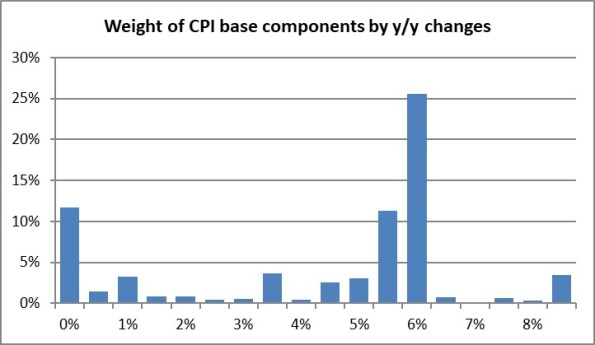 I don’t usually lead with the distribution, but it is important to keep this in mind. Inflation is not, especially at lowish levels (say, less than 5-8%), a smooth process. I used to liken this to the process of popcorn popping in a bag; the bag inflates but not because all of the kernels popped at once. The good news is that the popping is slowing, as the Fed has removed some of the heat from the bag, but the pops are still happening.
I don’t usually lead with the distribution, but it is important to keep this in mind. Inflation is not, especially at lowish levels (say, less than 5-8%), a smooth process. I used to liken this to the process of popcorn popping in a bag; the bag inflates but not because all of the kernels popped at once. The good news is that the popping is slowing, as the Fed has removed some of the heat from the bag, but the pops are still happening.
Now, here’s the good news. Thanks to core CPI being on target, the 3-month, 6-month, 9-month (well, never mind that one), and 12-month averages all decelerated.
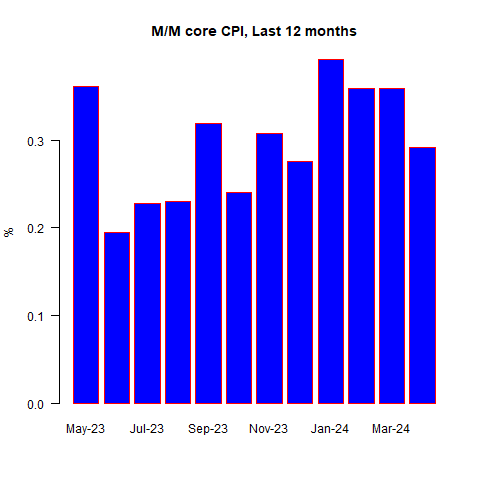 Median inflation won’t be out for a couple of hours, but my estimate this month is 0.348% m/m, essentially unchanged from last month. That’s sort of the bad news – the y/y median CPI should be stable this month at 4.5%.
Median inflation won’t be out for a couple of hours, but my estimate this month is 0.348% m/m, essentially unchanged from last month. That’s sort of the bad news – the y/y median CPI should be stable this month at 4.5%.
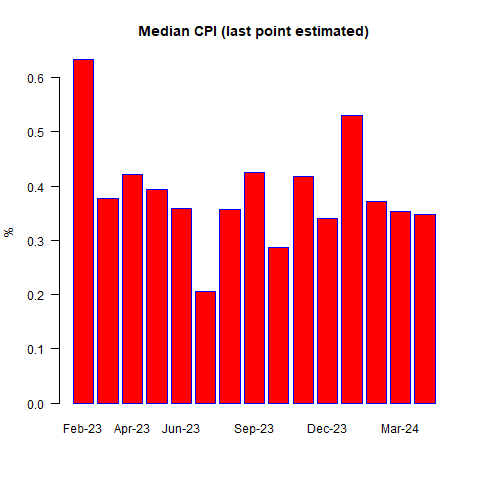
So, I think the bold type for the top line is this: inflation is decelerating, but slowly, and in a sticky fashion. The markets loved that answer and stocks and bonds leapt on the report. But that’s all framing. The debate coming into today was never about whether inflation was declining – it has been, for a while, and is expected to (even by me, and I’m on the high side of Street expectations by a fair amount) until at least Q3 and probably into Q4.
That wasn’t the question – we have known since the middle of last year that 2024 would see decelerating inflation. The question is whether the deceleration will continue after that, and whether it is decelerating to 3.75%-4.25% or 1.75%-2.25%. There is as yet no sign of the latter and all signs still point to the former, because the sticky stuff is not yet unstuck.
And that continues to boil down to this: deceleration is still being driven by core goods, and resistance to that deceleration by core services.
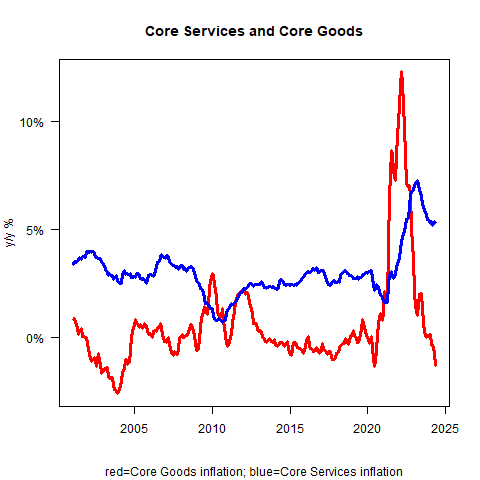
Core goods fell to -1.3% y/y this month. I have been saying that we’ve squeezed about all we can out of core goods, and then it drops from -0.7% to -1.3%, the lowest y/y figure in 20 years! This happened even though Apparel rose 1.2% m/m. As usual, the main culprits were autos with Used Cars -1.38% m/m after -1.11% last month, and New Cars -0.45% m/m.
Ironically, I think the continued softness in autos is due partly to the continued rise in motor vehicle insurance costs (which were +1.4% m/m again). We hear a lot about the affordability of housing, but you gotta have housing. You don’t gotta update your car.
The softness in core goods is welcome, naturally, but that’s the volatile part of CPI. And such low levels are only sustainable if the dollar continues to strengthen.
On the other hand, core services only softened to 5.3% y/y from 5.4%. A lot of that is housing, with OER +0.42% m/m (was +0.44% last month) and Primary Rents slowing to 0.35% from 0.41%. But outside that, ‘super core’ (core services less rent of shelter) is actually still bouncing higher. It’s 4.91% y/y – below the 6.5% it got to in late 2022, but well above the lows from October (3.75%).
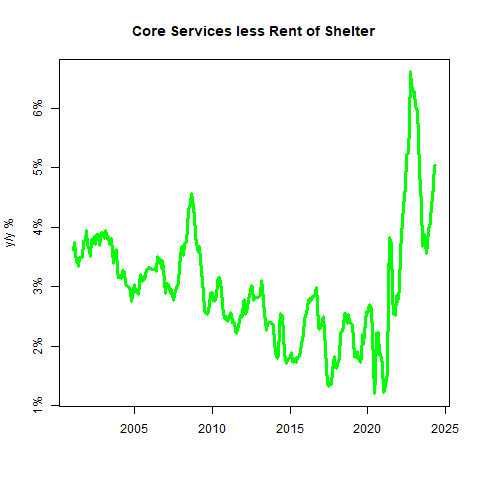
Some people will like the fact that the m/m Supercore was “only” 0.42% or so, which is down from recent months. But that’s a little deceiving. Airfares were -0.81% m/m, car/truck rental -4.6%, and the monthly health insurance bump has run its course and is back to a more normal m/m change (positive, but at a 3.5% annualized rate).
Longer-term, we still have to worry about the continued acceleration in, say, hospital services, which is +7.7% y/y. I pointed this out last month, and the picture is no prettier this month.
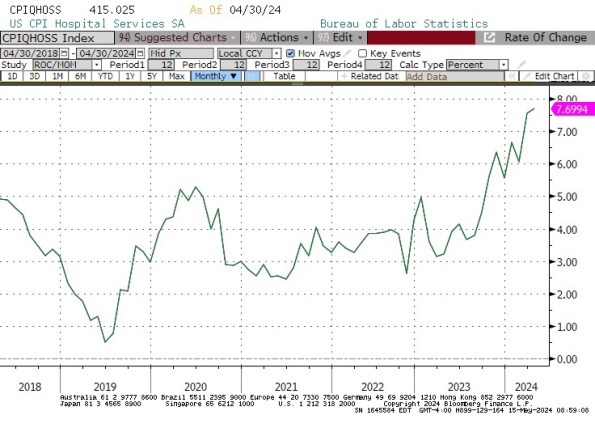
One other comment/update on rents: It is proceeding according to expectations, although I expect a slightly faster rate of deceleration for the next quarter or so. But then, all the signs are that rents are going to re-accelerate.
Even those terrible indicators that inflation dummies (this includes Yellen and most of the Fed) relied on to forecast that rents would be in deflation this year…even those indicators are showing a bounce to come. Home prices are accelerating again.
None of this is surprising given that landlords are facing higher costs and increasing demand (6 million immigrants need roofs). And this is why the inflation dummies are inflation dummies – there was never, never, a good argument for why rents should be in free fall, if you just spent 10 minutes talking to an actual landlord. Get your heads out of your models and look around occasionally, dummies.
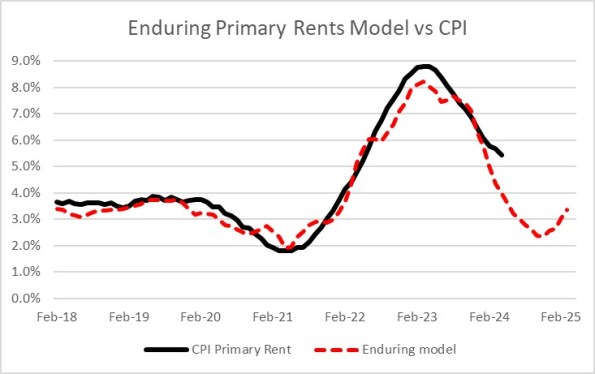
Okay, so that was a little strident but I am getting a little tired of asking potential clients how they are addressing inflation and hearing them tell me about their economist. Inflation hedging ≠ economists. Come on, people.
Let’s take this around to what we care about, and that’s policy. The Administration is trying to help the inflation figures by delaying the refilling of the Strategic Petroleum Reserve if prices go up, but is also implementing new tariffs on Chinese goods.
That answers the first WWJD question (what will Joe do) – in an election year, actions which cause inflation next year are fine…just not anything which causes inflation this year. The other WWJD question (what will Jerome do) is still interesting. Growth is indeed slowing, and has been slowing for some time.
Consumers are looking a bit tired, and unemployment is rising slowly. But inflation is not behaving. Median inflation won’t get below 4% until September at the earliest, and even optimistically won’t get to 3% before it starts to bounce. Before, the Fed could pretend that the new rent indicators showing widespread deflation gave it some latitude to move before the rent decreases actually arrived, but that isn’t a plausible argument any more.
However, the FOMC has started to lean more dovish. The significant decrease in the rate of taper that was announced at the last meeting clearly shows which way they are leaning. The case for a rate cut later in the summer (absent some financial crack-up that needs to be addressed) would be based on the Committee members’ sense that the current policy rate is above neutral and can be moved back towards neutral as the risks become ‘more balanced.’
Additionally, doves could argue that they don’t want to be seen easing right before the election so an ease at the end of July is a ‘down payment’ on looser policy later. The inflation data don’t support that, but the Fed doesn’t care only about inflation data.
If I was on the Committee, I would not vote to loosen the taper or lower rates, but I would not be surprised to see a token ease at the end-of-July meeting. It would be cavalier, and possibly political, and not supported by the data we currently have in hand…but it wouldn’t surprise me.
